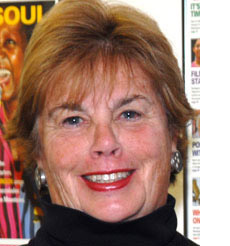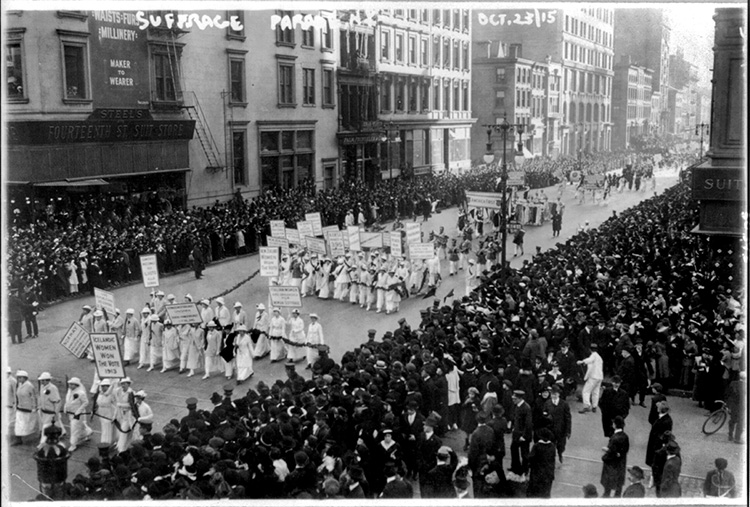| Publisher's Message | |||
| by Sue Gillis | |||
This is not the letter I intended to write about the election of 2016. We hoped that Hillary Clinton would win and that this message would be one of hope, love, and possibility. That we could share our joy with you about the election of the first woman president of the United States, Hillary Clinton. But this was not to be. She lost. She lost the electoral vote but won the popular vote: 59,238,524 to 59,088,024. The fifth time in history that this has happened. Millions are shocked, stunned, angry and fearful. Here’s why. Vermont Woman publishing spans a period of over 30 years. Hard to believe that in 1985, some 79 years after your death and 65 years after women won the right to vote, it was considered revolutionary that women would have the chutzpah to create a newspaper and name it Vermont Woman, for the sole purpose of providing a public forum for Vermont women voices. We thought a lot about the women who came before us, like you Susan. And it was the remembering of you that gave us the energy and spunk to do our best work. |
|
||
| We took chances making political endorsements, supported the Equal Rights Amendment (which failed in Vermont), equal pay, equal access to jobs and education, paid childcare, and reproductive choice, and we covered tough topics like women and AIDS, domestic violence, rape, incest, and the politics of breast cancer. And yes, we talked and dreamed about electing the first woman president.
So, we can’t help but imagine what you would have thought of the defeat of Hillary Rodham Clinton. Surely, you would be puzzled as to why it took so long to get to this point in the first place, but also you probably would be equally astonished at what it took to get her nominated as the first woman to a major party. But perhaps you would not be so surprised by the ugliness of her opponent and his millions of supporters after all. I mean, you sure saw your share of ugly just getting all those white guys in suits to “allow” women to vote. Actually, a lot of what got flung at Hillary might seem pretty familiar. For example, name calling, lies, false accusations, misogyny, references to her husband. An entire campaign driven by vulgarity and hatred. Then there was the odd unprecedented interference with the election process by Russia, stolen Wikileaks e-mails, and a troubling last-minute politicized shocker from the FBI, that most likely contributed to her losing critical votes in the last two weeks of the campaign. Sound familiar? What you may be more startled by was the violence her opponent incited. Donald Trump whipped his crowds into a frenzy of racism. He mocked the handicapped, insulted Muslim Gold Star parents, and was disgustingly sexist. He displayed great ignorance of policy, laws, the military, and geopolitics and a reckless disregard for the democratic process. Yes, I think you may be rolling in horror at the sewery depths Hillary’s opponent took himself, his supporters, and the very reputation of the Republican Party—their so-called family values—and our country. Against all the evidence of racism, bigotry, sexism, and ignorance, against all intelligence, and against all common decency, kindness, and unity, he won decisively. Republicans will rule the House, Senate, presidency, and the Supreme Court, all branches of government, unchecked. The Supreme Court alone will become an extreme right-wing majority for the next 25 years. Voters elected him to lead this country—but just barely. We will all live now with the divisive damage he has done, which is bound to continue for many years. A country already severely divided is now more so. It is impossible to grasp at this early stage how diminished women, African Americans, Muslims, Latinos, Mexicans, white educated men, white uneducated men, legal and illegal immigrants will proceed in this culture of hatred and distrust. It is also unnerving and unknowable how future international crisis will develop, what military intervention might occur, what will happen to hold back climate change, trade deals, the Iranian antinuclear agreement, health insurance coverage, reproductive rights, social security, pay equity, bank regulations, and tax reform, which are all under siege. Who knows what this loose-mouthed reckless behaving president might execute. In reading about your life, Susan B. Anthony, you would likely say: “My goodness, what has happened to those Americans who elected a president who care so little who they elect, just as long as there is radical change. Not even care what kind of role model he is to children, or if he has the ability to execute his plans or if he even has one. Let’s take the good that we have managed to salvage, give Hillary her due for taking us this far, and with all our might work hard for the sake of this great (and yes, imperfect) country—for the country, and for the future above all else. In other words, carry on!” So thank you, Susan, and all the women who came before you and those you worked with and those who will continue to fight on for years to come. We stand on your shoulders. We stand on Hillary’s shoulders.
|
|||
|
|||
In addition to their belief that women should be afforded better opportunities for education and employment, most of the Seneca Falls delegates agreed that American women were autonomous individuals who deserved their own political identities. A group of delegates led by Stanton produced a “Declaration of Sentiments” document, modeled after the Declaration of Independence, which stated: “We hold these truths to be self-evident: that all men and women are created equal; that they are endowed by their Creator with certain inalienable rights; that among these are life, liberty, and the pursuit of happiness.” What this meant, among other things, was that the delegates believed women should have the right to vote. Following the convention, the idea of voting rights for women was mocked in the press and some delegates withdrew their support for the Declaration of Sentiments. However, Stanton and Mott persisted–they went on to spearhead additional women’s rights conferences and they were eventually joined in their advocacy work by Susan B. Anthony and other activists. The turn of the 20th century brought momentum to the woman suffrage cause. Although the deaths of Stanton in 1902 and Anthony in 1906 appeared to be setbacks, the NASWA under the leadership of Carrie Chapman Catt achieved rolling successes for women’s enfranchisement at state levels. Between 1910 and 1918, the Alaska Territory, Arizona, Arkansas, California, Illinois, Indiana, Kansas, Michigan, Montana, Nebraska, Nevada, New York, North Dakota, Oklahoma, Oregon, South Dakota and Washington all extended voting rights to women. On the eve of the inauguration of President Woodrow Wilson (1856-1924) in 1913, protesters thronged a massive suffrage parade in the nation’s capital, and hundreds of women were injured. That same year, Alice Paul (1885-1977) founded the Congressional Union for Woman Suffrage, which later became the National Woman’s Party. The organization staged numerous demonstrations and regularly picketed the White House, among other militant tactics. As a result of these actions, some group members were arrested and served jail time. In 1918, President Wilson switched his stand on women’s voting rights from objection to support through the influence of Catt, who had a less-combative style than Paul. Wilson also tied the proposed suffrage amendment to America’s involvement in World War I (1914-18) and the increased role women had played in the war efforts. When the amendment came up for vote, Wilson addressed the Senate in favor of suffrage. As reported in The New York Times on October 1, 1918, Wilson said, “I regard the extension of suffrage to women as vitally essential to the successful prosecution of the great war of humanity in which we are engaged.” However, despite Wilson’s newfound support, the amendment proposal failed in the Senate by two votes. Another year passed before Congress took up the measure again. On May 21, 1919, U.S. Representative James R. Mann (1856-1922), a Republican from Illinois and chairman of the Suffrage Committee, proposed the House resolution to approve the Susan Anthony Amendment granting women the right to vote. The measure passed the House 304-89—a full 42 votes above the required two-thirds majority. Two weeks later, on June 4, 1919, the Senate passed the 19th Amendment by two votes over its two-thirds required majority, 56-25. The amendment was then sent to the states for ratification. Within six days of the ratification cycle, Illinois, Michigan and Wisconsin each ratified the amendment. Kansas, New York and Ohio followed on June 16, 1919. By March of the following year, a total of 35 states had approved the amendment, one state shy of the two-thirds required for ratification. Southern states were adamantly opposed to the amendment, however, and seven of them—Alabama, Georgia, Louisiana, Maryland, Mississippi, South Carolina and Virginia—had already rejected it before Tennessee’s vote on August 18, 1920. It was up to Tennessee to tip the scale for woman suffrage. The outlook appeared bleak, given the outcomes in other Southern states and given the position of Tennessee’s state legislators in their 48-48 tie. The state’s decision came down to 23-year-old Representative Harry T. Burn (1895-1977), a Republican from McMinn County, to cast the deciding vote. Although Burn opposed the amendment, his mother convinced him to approve it. (Mrs. Burn reportedly wrote to her son: “Don’t forget to be a good boy and help Mrs. Catt put the ‘rat’ in ratification.”) With Burn’s vote, the 19th Amendment was ratified. Certification by U.S. Secretary of State Bainbridge Colby (1869-1950) followed on August 26, 1920. On November 2 of that same year, more than 8 million women across the U.S. voted in elections for the first time. It took over 60 years for the remaining 12 states to ratify the 19th Amendment. Vermont in 1921 and Mississippi was the last to do so, on March 22, 1984. From the National Archives. |
|||
Suffragette Parade NYC 1915, photo: Library of Congress
|
|||
| Sue Gillis is the Publisher of Vermont Woman.
|
|||



